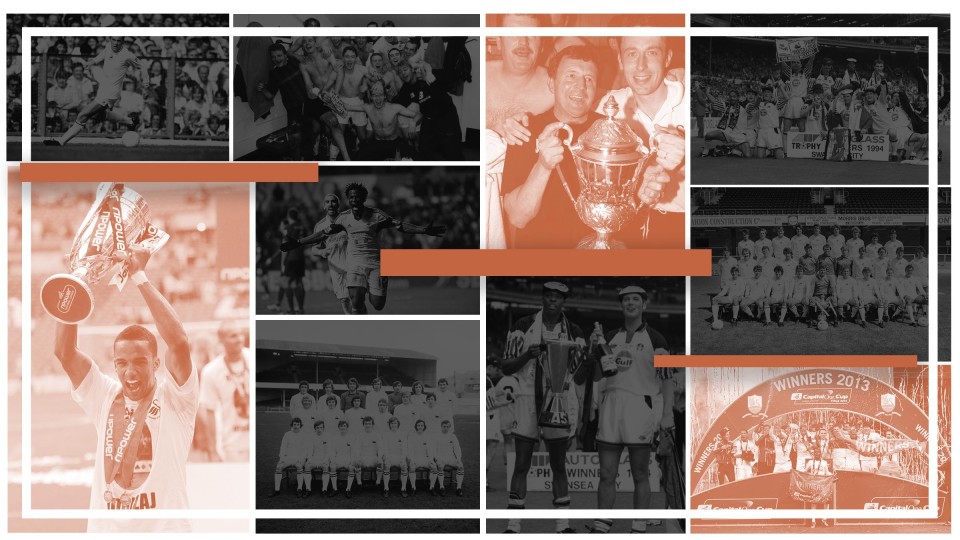Classic Seasons: 1984-85
In a regular website feature, we look back through the history books at a memorable Swans campaign.
Here, we go back to 1984-85, a turbulent campaign which ended on a high note.
The Swans’ brief spell in the First Division dream was fast becoming a distant memory over after a second consecutive relegation meant they were plying their trade in the third tier of English football.
Not only that, but the financial implications of the Swans’ tumble down the leagues were beginning to show.
Deep in debt and having to sell players at cut prices just to get them off the wage bill, the club’s situation was desperate.
In the hope of halting the slide, the board appointed Colin Appleton (above) as the Swans’ new manager in May.
Appleton had impressed during his spell with Hull City, another club who had little money to spend, and it was hoped that he could inspire an upturn in fortunes at Vetch Field.
With a lack of funds available, he was forced to enter the free and loan markets and brought in the experienced Tony Kellow and Paul Richardson, as well as young midfielder Steve Mardenborough (below).
However, the opening three months of the season brought just three league wins and saw the Swans firmly rooted to the bottom of the league table, while they also exited the League Cup at the hands of Walsall.
Appleton had frequently juggled his squad as he looked to find a winning formula that never materialised and, when the Swans were beaten by non-league Bognor Regis in the FA Cup, the writing was on the wall for the manager.
Following the hunt for a new boss, John Bond (below) was named as Appleton’s replacement.
The former West Ham United defender had enjoyed success with the likes of Norwich and Manchester City, who he had guided to the FA Cup final just three years earlier.
However, despite bringing in the likes of Robin Turner, Colin Sullivan and Derek Parlane (below) in a bid to strengthen the squad, Bond’s appointment did not initially provide the desired impact, as the Swans won just one of his first seven matches in charge.
They did embark on an unbeaten run through February, but won only once in four league games, and did not taste victory again until the end of March, when Preston North End were comprehensively beaten 4-1 at the Vetch.
That result seemed to spark the Swans into life as they went on to win four of their next five games to move up to 20th in the table, but a run of three matches without victory followed and sent them back into the relegation zone.
The Swans hosted Bristol Rovers on the penultimate weekend of the season, when Parlane’s 88th-minute penalty secured a dramatic 3-2 win and sent them into a do-or-die showdown with Bristol City on the final day.
Lying in the final relegation place, the Swans knew a point would be enough for them to escape a third consecutive demotion at the expense of Burnley.
Nearly 11,000 fans were present for a tension-filled game and it was the Swans who were on the front foot in the early stages.
They took the game to the visitors and went in search of an early goal to calm the nerves.
Goalkeeper John Shaw did well to deny Parlane and Alan Waddle while at the other end, Jimmy Rimmer (below) beat away Glyn Riley’s effort after the Bristol City forward had broken through the home defence.
That chance was a warning for the home side. The Robins began to dictate the play after the break and the Swans dropped deeper as a result.
Rimmer was again on top form with a brilliant fingertip save to deny Alan Walsh, while former Swan Mark Hughes saw a header cleared off the line.
The goal never came, though, and the Vetch erupted as if the Swans had won a cup final when the full-time whistle blew.
The Swans had avoided relegation to the Fourth Division, but they still faced an uphill task in the near future to reverse the downward trend in their fortunes of recent years.
1984
FEBRUARY 14 Jayne Torvill and Christopher Dean skate off with Olympic gold in Sarajevo as their Bolero routine scores maximum points for artistic impression.
JUNE 18 The miners’ strike continues as 123 people are injured in the Battle of Orgreave, which sees a violent confrontation between police and pickets.
OCTOBER 31 Indira Ghandi, the third Prime Minister of India, is assassinated by her bodyguards at her home in New Delhi.
1985
APRIL 29 A total of 18.5 million people are watching after midnight as Dennis Taylor beats Steve Davis on the final black to win the World Snooker Championship in Sheffield.
MAY 11 Fire sweeps through the main stand during Bradford City’s showdown with Lincoln City at Valley Parade. A total of 56 people are killed.
JULY 13 Inspired by Bob Geldof and Midge Ure, the Live Aid concerts take place at Wembley Stadium and the JFK Stadium in Philadelphia, raising funds for the Ethiopian famine. To date, an estimated £150 million has been raised.
